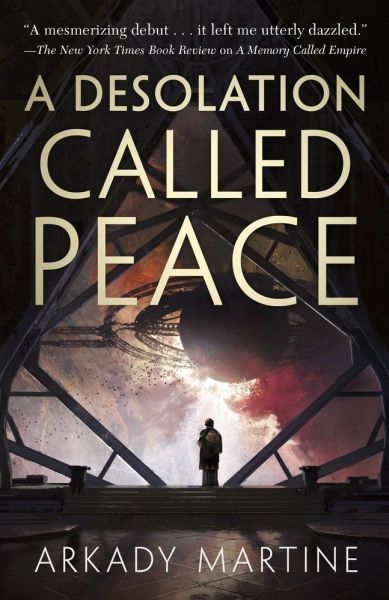Howling
A Desolation Called Peace (Teixcalaan, volume 2)
By Arkady Martine

31 Mar, 2022
2021’s A Desolation Called Peace is the second volume in Arkady Martine’s Teixcalaan space opera series.
Alerted by neighbouring Lsel Station that an unknown alien menace is impinging on human space, the Teixcalaanli investigate. First contact between a force headed by Fleet Captain Nine Hibiscus and the aliens establishes five facts:
- There are aliens.
- They are of an unknown type.
- They appear bent on conquering human worlds.
- Communication appears to be impossible.
- They are merciless.
The aliens have the ability to appear seemingly out of nowhere and attack human ships and human worlds. Pilots of ships that encounter the aliens are digested. Worlds unlucky enough to be attacked are comprehensively, horrifyingly, depopulated. Goods produced on those worlds are carried off-planet. The means of production are destroyed. The aliens may be incomprehensible to humans, but they understand human supply lines and logistics.
The Teixcalaanli are relentless imperialists; Lsel Station (low population and isolated) is happy to have the empire too distracted to conquer the station. However, Mahit Dzmar, former ambassador to the Teixcalaanli, is a person of concern to the station. Dzmar shares her mind with a copy of the mind of the previous (deceased) ambassador to the empire, Yskandr Aghavn. Yskandr Aghavn’s behavior before his death was highly suspicious. Has Dzmar been contaminated by Yskandr Aghavn?
This is a question Dzmar would like to avoid answering, if only to avoid revealing that she has two versions of the late Yskandr in her head: an old, outdated version that Lsel Station knows about as well as a far more recent copy. She can’t just lie about this; the same technology used to imprint Yskandr on Dzmar can be used to copy and examine the entire contents of her mind. When she is asked to return to the empire as a consultant, to help in the ongoing war between the empire and the aliens, Dzmar eagerly accepts.
The Teixcalaanli have vast resources. However, even by imperial standards, the war is expensive. Even by the standards of a polity that will happily squander lives in internal political squabbles — internal political squabbles being the Teixcalaanli national sport — the death toll is grim. Unable to negotiate a cease fire because the two sides seem incapable of talking, the new emperor Nineteen Adze begins to consider straightforward genocide. Burning an alien-held world to a lifeless cinder might get the enemy’s attention.
Genocide is a tool the Teixcalaanli set aside long ago. Resorting to it would be a giant step backward. However, Nineteen Adze seems to have no choice. No choice, that is, unless Dzmar and her Teixcalaanli friends can somehow find a way to bridge the gulf between humans and aliens … aliens who seem to lack both the interest and the ability to communicate with humans.
Unsurprisingly for a story involving the Teixcalaanli, while the solution involves incisive science, it also involves sacrifice.
~oOo~
The author provides snippets of alien perspective. The reader is not left wondering if the aliens are people that it might be wrong to kill or if they are simply more akin to a force of nature the stymying of which more akin to flood control than war. They are people.
For reasons that are a huge spoiler, I am not sure that what the empire plans to do is genocide. For moral quandary purposes, however, it only matters that humans believe that it is.
The rest of this review will mostly be cranky cane-waving. Sorry.
A Desolation Named Peace is about 500 pages long. I would have been happier if it were shorted by a fifth. Blame tastes developed when SF novelists had to argue persuasively to get page counts beyond 150 pages.
My antipathy towards empires, particularly futuristic ones, probably makes me not exactly the best choice to review this [1]. I really don’t care whether the Teixcalaanli empire survives or not, although I will grant that the empire having unpleasant habits does not justify the aliens eating helpless individual imperials alive. The empire might argue that it provides subjects with sufficient benefit to compensate for the cost of membership but those arguments do not convince me.
At least Lsel Station has the excuse that their less wonderful choices (the treatment of Dzmar, for example) are generally driven by their lack of resources and population. Without much margin for survival, there is little margin for error. It’s easy to slide into oppressive policies if one thinks the alternative is conquest or extinction.
At least the individual characters are sympathetic, even if their respective nations are not. When Dzmar is threatened and when GIANT SPOILER SPOILERS, readers will care. As well, Martine’s writing is head and shoulders above the prose of other space opera writers. One can at least enjoy the writing.
A Desolation Called Peace is available here (Amazon US), here (Amazon Canada), here (Amazon UK), here (Barnes & Noble), here (Book Depository), and here (Chapters-Indigo).
1: Readers may remember that this was why I didn’t like the Ancillary books as much as many other people did.
